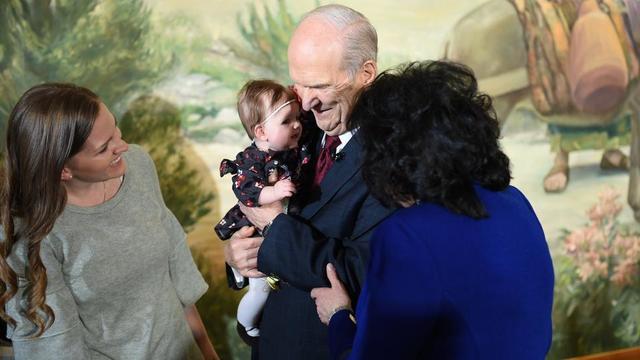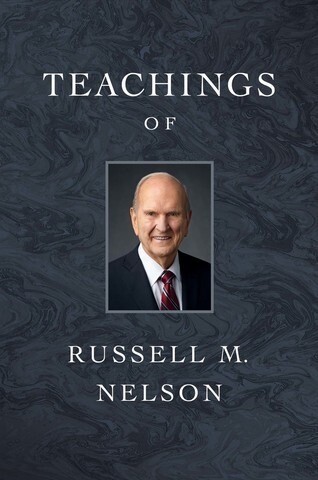Throughout his service in the Church, President Nelson has provided profound insight into family history work, the spirit of Elijah, and redeeming our kindred dead. Here is a small portion of those insights, excerpted from the new book Teachings of Russell M. Nelson.
This is part of an ongoing series where we highlight the teachings of our prophet weekly.
Every human being who comes to this earth is the product of generations of parents. We have a natural yearning to connect with our ancestors. This desire dwells in our hearts, regardless of age.
Consider the spiritual connections that are formed when a young woman helps her grandmother enter family information into a computer or when a young man sees the name of his great-grandfather on a census record. When our hearts turn to our ancestors, something changes inside us. We feel part of something greater than ourselves. Our inborn yearnings for family connections are fulfilled when we are linked to our ancestors through sacred ordinances of the temple. (“Generations Linked in Love,” Ensign, May 2010)
A Refining Influence
Any discussion of family responsibilities to prepare for exaltation would be incomplete if we included only mother, father, and children. What about grandparents and other ancestors? The Lord has revealed that we cannot become perfect without them; neither can they without us be made perfect (see Doctrine and Covenants 128:15). Sealing ordinances are essential to exaltation. A wife needs to be sealed to her husband; children need to be sealed to their parents; and we all need to be connected with our ancestors (see Doctrine and Covenants 128:18). (“Salvation and Exaltation,” Ensign, May 2008)
While salvation is an individual matter, exaltation is a family matter. (“Celestial Marriage,” Ensign, November 2008)
While temple and family history work has the power to bless those beyond the veil, it has an equal power to bless the living. It has a refining influence on those who are engaged in it. They are literally helping to exalt their families.
We are exalted when we can dwell together with our extended families in the presence of Almighty God. The Prophet Joseph Smith foresaw our duty: “The great day of the Lord is at hand . . . ,” he said. “Let us, therefore, as a church and a people, and as Latter-day Saints, offer unto the Lord an offering in righteousness; and let us present in his holy temple . . . a book containing the records of our dead, which shall be worthy of all acceptation” (Doctrine and Covenants 128:24).
The preparation of that record is our individual and collective responsibility. As we work together, we can make it worthy of all acceptation by the Lord. That record enables ordinances to be performed for and accepted by our deceased ancestors, as they may choose. Those ordinances can bring liberty to captives on the other side of the veil. (“Generations Linked in Love,” Ensign, May 2010)
A Work to Continue Through the Millennial Era
There was no provision for baptism for the dead when the Kirtland Temple was designed. Yet it served an important preparatory purpose. One week after its dedication, the Lord came personally to the temple to accept it. Then, under His direction, Moses, Elias, and Elijah restored specific keys of priesthood authority.
Five years later, the Saints were in Nauvoo, Illinois. There the Lord again commanded them to build a temple—this time with additional facilities—because, He said, “a baptismal font there is not upon the earth, that they, my saints, may be baptized for those who are dead—for this ordinance belongeth to my house” (Doctrine and Covenants 124:29–30).
Then, to make certain that there could be no misunderstanding, He issued a solemn word of warning: “If you do not these [baptisms for the dead] . . . ye shall be rejected as a church, with your dead, saith the Lord” (Doctrine and Covenants 124:32; emphasis added). (“The Spirit of Elijah,” Ensign, November 1994)
In temples of antiquity, . . . baptisms for the dead were not performed. Those ordinances were reserved for our day. Only after the Lord preached to the spirits in prison did the Lord prepare for baptisms and other vicarious temple ordinances to be done for deceased persons. This dispensation of the fulness of times is the great era of vicarious ordinance work, a work which will continue on through the millennial era. (“Your Commission and Charge,” Temple Presidents Seminar, August 16, 1995)
Ordinances of the temple relate to personal progress and to the redemption of departed ancestors as well. “For their salvation is necessary and essential to our salvation, . . . they without us cannot be made perfect—neither can we without our dead be made perfect” (Doctrine and Covenants 128:15). Service in their behalf provides repeated opportunities for temple worship. And that service deserves commitment to a planned schedule. By doing for others what they cannot do for themselves, we emulate the pattern of the Savior, who wrought the Atonement to bless the lives of other people. (“Personal Preparation for Temple Blessings,” Ensign, May 2001)
Lead image of President Nelson holding one of his great-granddaughters, from Newsroom
Read more profound insights from our prophet in Teachings of Russell M. Nelson.
Internationally renowned as a surgeon, teacher, and man of great faith, President Russell M. Nelson has dedicated his life to healing hearts and ministering throughout his medical career and his Church service. This definitive volume of his teachings presents excerpts from his speeches and writings spanning more than three decades as an Apostle of the Lord, including many from his recent world tour and other unpublished addresses. Alphabetically arranged by topic, these teachings on more than 100 subjects provide a perfect, easy-to-use resource for talks, lessons, and more.



